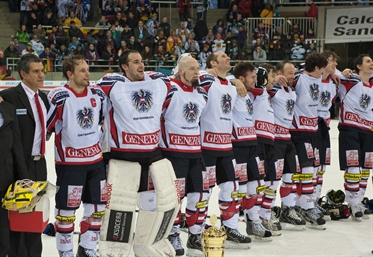The team-first approach
The team-first approach
Viveiros preaches unity in Austria’s Olympic return

 Austria upset Germany and ended its consecutive Olympic participation streak dating back to 1952. Is there more magic left for Sochi?
Austria upset Germany and ended its consecutive Olympic participation streak dating back to 1952. Is there more magic left for Sochi?
Austria, a team that has bounced up and down between the top two divisions of the World Championship, stunned favourites Germany on its own ice to qualify for the first time since the 2002 Olympics in Salt Lake City.
Since then, the team has had a few ups and downs, with signature wins over Latvia and Slovakia at the 2013 World Championship tempered by losses to France and Germany that sent the Austrians back down to Division IA for next April.
But the disappointment of another relegation year wasn’t as tough to deal with this season, knowing that Sochi is around the corner. Talking to the players and coach, the constant message that comes up is one of unity through adversity, and a belief in the system that brought this team to Sochi.
“Everybody working hard, everybody buying in, everybody sacrificing,” said goaltender Bernhard Starkbaum. “That’s the big point. It’s not just the defenders, everybody has to take a role in our own end whether it’s blocking shots or staying with your guy.”
But the going won’t be easy, not by a long shot. Austria, 15th in the IIHF World Ranking, will be playing in Group B with defending Olympic champions Canada, 2011 World Champions Finland, and 9th-ranked Norway.
“Realistically, when you look at the talent and all the other countries here, our chances of getting a medal aren’t as high as everyone else’s, and we understand that,” said head coach Manny Viveiros. “But then again our goal is to go there and win, but also a big goal for us is when we leave Sochi that we can say that Austria is proud of our men’s national team, and if we do that and play in that way everything will take care of itself.”
No one doubts that in order for Austria to have any success production has to come from its trio of NHL players: Michael Grabner, Michael Raffl, and All-Star Thomas Vanek. Vanek and Grabner, the top two all-time Austrian NHL scorers, will especially be counted on to put pucks in the net.
It’s interesting to note that, had things turned out differently, Vanek might have gone to Sochi with a different country. When the Austrian was just beginning to establish himself as an elite prospect, the Slovak ice hockey federation found out that Thomas' mother Jarmila was Slovak, and invited the rising star to join the national team's training camp. Thomas declined the invitation and instead joined the Austrian junior squad.
"I got approached at the age of 16, went to one camp in Slovakia, and shortly after got contacted by the Austrian team that I’m in their future plans for the Under-18 and Under-20 team, and also in their future plans for the men’s team." said Vanek. "After that discussion, I was pretty much set to play for Austria because I grew up there and felt like that was the country I wanted to play for. I don’t regret the decision, even though my parents are Slovak (my mom is Slovak, my dad is Czech), I grew up in Austria – was born and raised there – and for that reason I felt that I’m more Austrian than Slovak."
Good thing for Austria. Vanek, who broke into the NHL with a 48-point rookie season in 2005/06 and has consistently been among the best players in the league, has been red-hot for the New York Islanders this year, especially in the month of January. In his past 21 games the Austrian forward compiled nine goals and 16 assists playing on the team’s top line alongside Team Canada forward John Tavares.
Joining Vanek in Sochi will be Grabner, his teammate with the Islanders. The 26-year-old sniper has just nine goals so far in the 2013/14 NHL season, but has heated up of late with four goals in five games. His most recent international experience with the Austrian team came during the 2012 IIHF World Championship Division I Group A, where he notched four assists in five games to help his team earn promotion back to the top division.
"We’ve gotten some systems from our coach already, but we’re just going to try to play our style and keep up with the other team," said Grabner. "We have a lot of good skaters on our team, so I don’t think we’re going to do ourselves any favours by just sitting back and letting the other team dictate the play."
"For me and [Michael] Grabner, it's exciting just to be part of the Olympics. And I think our country is excited," said Vanek in an interview with NHL.com. "We obviously have our skiers and ski jumpers that do well, but for an actual team to go there, people are excited. But again, I'm not going there thinking we're going to win a medal. I watched the qualification on the internet against Germany when we made it and that alone felt like a medal.”
The third NHLer on the team is Philadelphia Flyers rookie Michael Raffl, who has been making a big impact in his first season.
Then there are the guys who made it all happen back in Germany in February 2013. Of the players that were on the team that won the final qualification tournament in Bietigheim-Bissingen, 15 players to date have been confirmed for Sochi.
Among those are younger players that will form the base for the team’s development into the future, players such as Thomas Hundertpfund of Timra IK in the Swedish second league. With a noticeable dropoff in proven talent at the center position, it will be interesting to see if Viveiros opts to go with Hundertpfund on the top line or move Raffl from the wing to center, where he played for most of his career prior to Philadelphia.
“There are some younger players that over the last couple of years have really stepped up and surprised, for instance Thomas Hundertpfund is a player that can certainly help us,” said Viveiros. “Also Stefan Ulmer is a player that plays in the Swiss league and is having a fantastic season with Lugano. He’s a good, young mobile defenceman that can make a big impact for us.”
But the presence of these young guns doesn’t mean that Austria is inexperienced, even at the Olympic level. The top veteran on the team is without a doubt 37-year-old defenceman Gerhard Unterluggauer, who has played in 239 international games, including Austria's last Olympics in 1998 and 2002.
“He knows at times what can be a distraction, like when you’re rubbing elbows with the best athletes in the world in their respective sports,” said Viveiros. “Players like him can draw on their own experience in making sure the other guys don’t get too distracted, get themselves prepared and get enough rest. His experience will be invaluable for us.”
Defencemen Andre Lakos, Matthias Trattnig, Robert Lukas and Thomas Pock, along with forward Oliver Setzinger all played in Salt Lake 2002. The veterans on defence will be counted on to work together as a unit, if the Austrian team is to have any success in Sochi. This was the same feeling echoed by Viveiros, when asked how big of a role Austria’s defence needs to be in the Olympics.
“That could be the understatement of the year (laughs),” he said. “It’s something we’ve been discussing a lot with the players at this moment right now. We’ve sent out videos to our players talking about how we’re going to organize and be compact in our own defensive play. We know that there will be a lot of defensive pressure on us and we have to be prepared to play a lot of times without the puck, but that means we have to be really organized and work together as a team.”
Projected finish
The fact that Austria is even playing in these Olympics is an achievement in itself. Paired up with Canada, Finland, and Norway in Group B, the Austrians will have to hit the ground running with their opening game on 13 February against the Finns. But the firepower this team is facing is a different animal than what the Austrians have faced in the 2013 Worlds and in Division I, and a 10th or 11th place finish is likely to be in the cards.
Top-3 players
Thomas Vanek: The undisputed top player for Austria, Vanek will be counted on to be the talisman of the Austrian offence, but will almost certainly draw a lot of attention from some of the world’s best defensive players throughout the Olympics. His skill set is undeniable though, and the 30-year-old tends to play big for his country in big games.
Michael Grabner: With his blazing speed and offensive savvy, Grabner is a perfect complement to Vanek as a secondary scorer. While his international experience is limited, he is one of the top penalty killers on the Islanders, and could help the Austrians who will undoubtedly be playing in their own zone more often than not.
Bernhard Starkbaum: Locked in as the starting goaltender for Sochi, Stakbaum was a big part of the team’s successful qualification run, posting a 1.97 GAA and a 93.41 save percentage in three games. The Vienna native is used to handling a big workload playing on the Austrian team. At the 2013 Worlds he faced a tournament-high 227 shots on net, but still managed to turn in fine performances in games against Latvia and Slovakia. "Strong goaltending is the key for our team against any big nation," said Vanek. "Obviously it’s important for our team to play well in front of him, but the key is goaltending."
Dark Horse
Michael Raffl: The youngest of the Raffl brothers (elder Thomas is also on the national team and plays for Red Bull Salzburg) has four goals and 13 points in 36 games in his rookie campaign with the Philadelphia Flyers. “A pleasant surprise has been Mickey Raffl, how well he’s done in that first year in Philadelphia,” said Viveiros. “We all knew he was an NHL player, but for him to go in on his first time and adapt so quickly to the North American style has been outstanding.”
Back to Overview











































